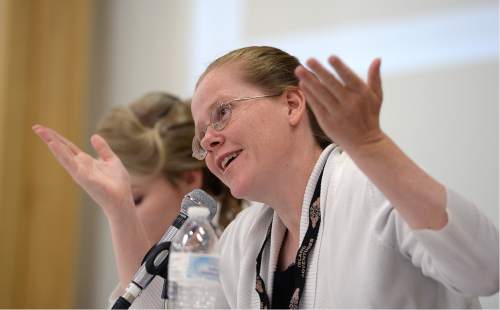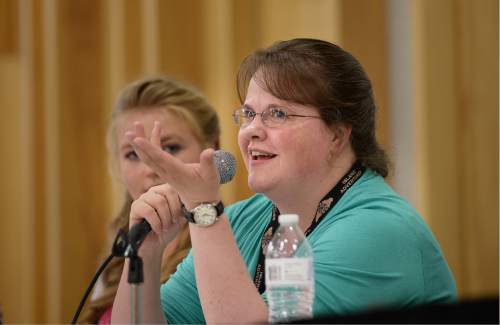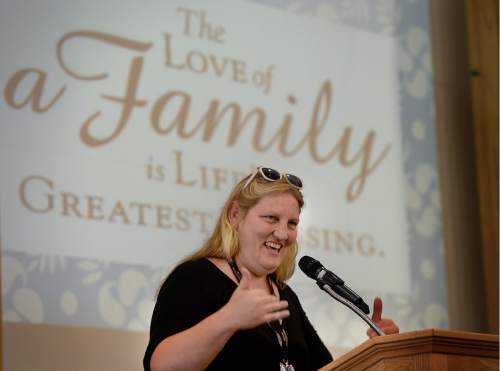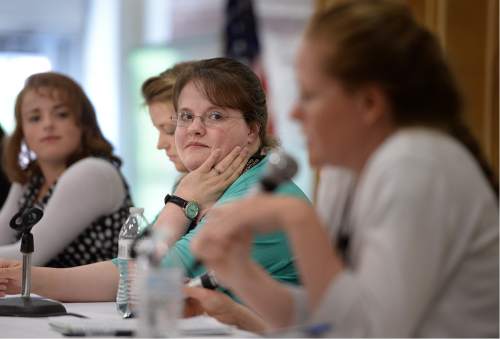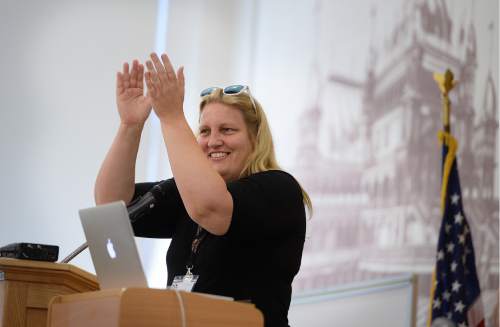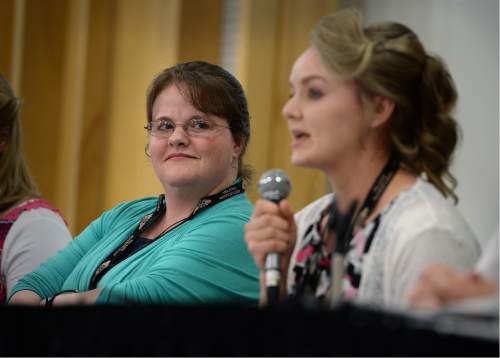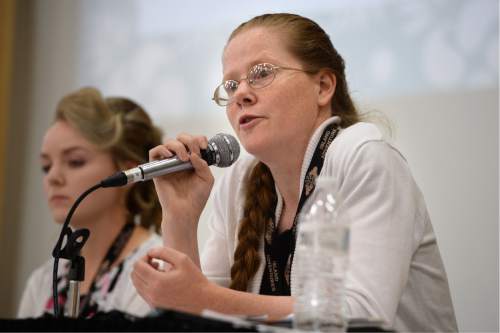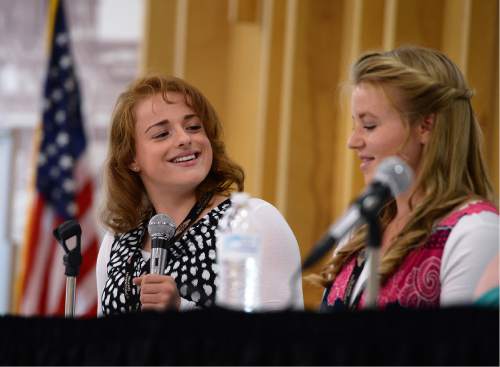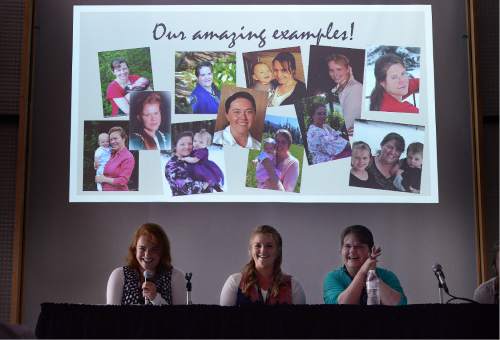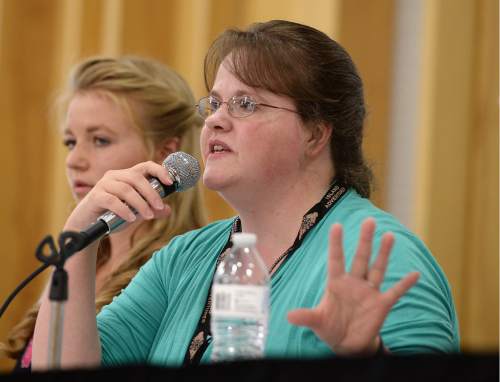This is an archived article that was published on sltrib.com in 2016, and information in the article may be outdated. It is provided only for personal research purposes and may not be reprinted.
The audience emitted a gasp when Edith Barlow told them she was a man's 13th wife.
Barlow was used to it.
"People say, 'Thirteenth? Are you freaking kidding me?' " said Barlow, 39.
Barlow's husband, Canadian polygamist Winston Blackmore has married 27 women in all. He has 145 children, according to some of them who sat beside Barlow on Thursday at the annual Sunstone Salt Lake Symposium, held at the University of Utah.
Two of Blackmore's wives and three of his children on Thursday described the dynamics of a family bigger than some Utah towns. They also gave insights into Blackmore, whom Canadian authorities are prosecuting for polygamy, and who was once a bishop in the Fundamentalist Church of Jesus Christ of Latter-Day Saints.
The Blackmores and other polygamous families live in a community called Bountiful within the town of Lister, British Columbia, near the border with Idaho. Eleven of Blackmore's wives have left the family over the years, though 16 remain.
Barlow is from Hildale, Utah, and was born into a family where her father had four wives. She said that as a teenager she did some "soul searching" to decide if she wanted to be a polygamist. She eventually decided to marry Blackmore.
"I'm not here to sugar coat anything," Barlow told the audience. "There were some dang hard days, and there still is."
Barlow said she is a "full-time working mother." The sister wives rely on each other for support — spiritual, emotional and logistical. They care for each other's children. Scheduling and personality conflicts arise, Barlow explained, creating a steady routine of addressing one issue as another arises.
But there is no matriarch, Barlow said. Blackmore has told his wives they are not to complain to him about the other wives, she said. They must work out their problems with each other.
"One day he said to me," Barlow said, pausing to sigh before continuing, " 'I can't imagine living with just one of you guys.'
"And I said, 'Right back at you, dude.' "
Barlow's younger sister Elise, 36, married Blackmore, too. But first, she became the second wife in another family. It didn't go well, she said.
Elise says the first wife was controlling, wanting to know where Elise was and making her turn in her money to the sister wife. Elise said her days revolved around trying to please her sister wife, and she had no relationship with her husband and had no children of her own — and the first wife would not allow her to interact with her children.
"The hardest thing in all this was I couldn't love her children," Elise said. "Children are my life and I couldn't touch her children."
After three years, church leaders could see the marriage wasn't working. Elise said she was offered the chance to go to a new family. She chose to become Blackmore's 25th wife.
Shortly after joining the family, Elise said, she picked up a crying baby, then turned to see which mother would yell at her for doing so. Instead, a mother thanked her for helping.
Blackmore recognized how well she worked with children, Elise said, and encouraged her to go to college. She earned a bachelor's degree in education.
Elise will be married to Blackmore 15 years next month. They have five children.
"I had to get close to Christ and the Gospel laid out by Joseph Smith and that's what I want to teach my children," Elise said.
Plural marriages came to a halt for a time after The Split, when the Jeffs family evicted Blackmore from the church in 2002. Many of the Blackmores' parishioners opted to follow him to Canada.
But one of the Blackmore daughters, Hanna Blackmore, decided she wanted more than the monogamous marriages her sisters had. At age 19, she decided to marry a man who already had a wife. A third wife arrived later, Hanna said. The family now lives in Salt Lake County.
Hanna, 24, said she considers plural marriage to be as important as other Mormon principles.
"I don't think we can just get rid of a part of the Gospel just because we don't agree with it or it's too difficult," she told the audience.
Hanna describes polygamy as more heartache and more joy.
Two other Blackmore daughters described their relationships with their 143 other siblings and their 72 nieces and nephews.
"We never run out of people to love and people to love us," said 19-year-old Elsie Blackmore.
She is Blackmore's 37th child and the oldest unmarried child still living in his home. She is in charge of the community's relief society — volunteers of girls ages 13 to 19 who perform community projects.
"We are probably the only family that can have a bull elk killed, cleaned and eaten in under an hour," Elsie said.
Dollie Blackmore, 18, showed slides of some of her siblings and the nieces and nephews her age. The generations grow up together, she said, with both the mothers and the older siblings looking out for them.
Dollie said young children see Blackmore most in groups. They eat breakfast with him, and he knows all their names. When a child wants time with Blackmore, all he or she has to do is ask and they can go with him to work or follow him for the day.
"He's there for us if we want him to be," Dollie said.
Twitter: @natecarlisle


